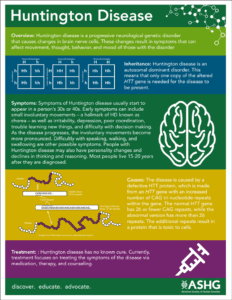Genetic diseases are caused by random changes in our DNA called variants or mutations. When a variant occurs, it can change the way a gene functions or the protein it codes for. This change can cause a disruption in the body that may cause a disease. These changes can be passed on to the next generation in different ways:

Autosomal dominant diseases are caused by variants in genes found on non-sex chromosomes. For these diseases, only one altered copy of the gene in each cell is needed for a person to be affected. In most cases, an affected person inherits the condition from a parent who has the disease.
Huntington disease is inherited via an autosomal dominant genetic change. A person who has one change in the HTT gene will develop Huntington disease even if the second copy of the gene is healthy.
Autosomal recessive disease genes are also found on non-sex chromosomes. For a person to have an autosomal recessive disease, both copies of the gene must be altered (see figure 5). Many diseases, such as cystic fibrosis, follow an autosomal recessive inheritance pattern.
Carriers are people who have only one altered copy of a gene for a recessive disease. Since two altered copies are necessary to have the disease, a carrier would not have the disease but would carry it in his or her DNA. Carriers of an autosomal recessive disease are at risk of having children with the disease, but only if their partner is also a carrier of the same disease.
X-linked recessive diseases are caused by genetic variants on the X chromosome. In males, who have only one X chromosome, only one altered copy of the gene is necessary to cause the disease.
Because females have two X chromosomes, they are less likely to have an X-linked disease. If they do inherit an X-linked disease, they may be less severely affected. Many females who have only one altered copy of the gene are unaffected carriers.
Red-green colorblindness is an example of an X-linked recessive disorder.
X-linked dominant diseases are caused by mutations in the X chromosome. Only one altered copy of the gene is needed to cause disease.
Last reviewed and updated August 2019
